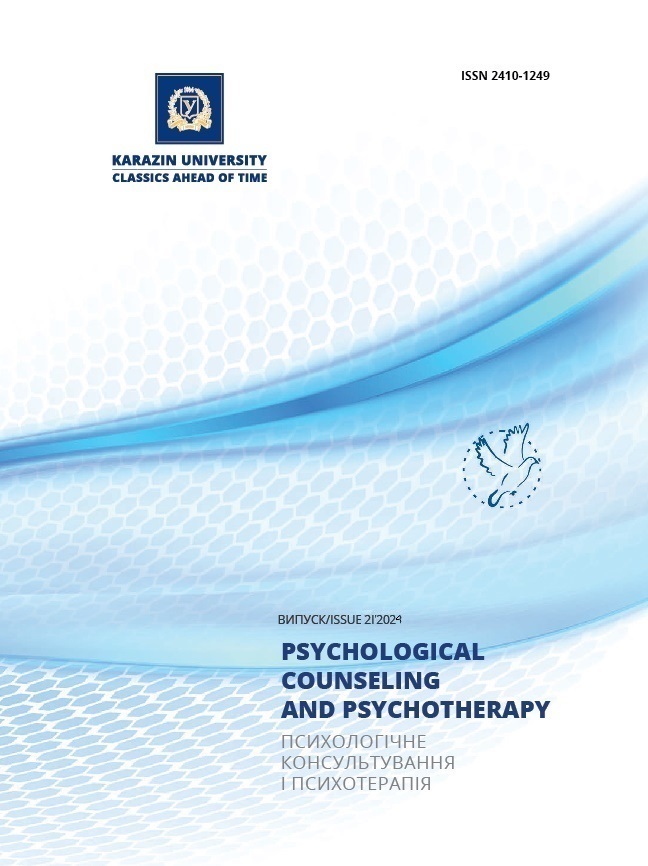Features of the Emotional Component of Essential Self-Regulation Associated with Women's Marital Satisfaction
Abstract
The article is dedicated to the study of the emotional component of essential self-regulation, which is related to women's marital satisfaction. Contemporary research on various aspects of the emotional sphere of personality and their connection to marital satisfaction is analyzed. The emotional component of essential self-regulation is considered one of the psychological regulators of the tendency towards self-actualization. Marriage is one of the directions of self-actualization, in which the tendency towards self-actualization is also realized. Therefore, we hypothesized that emotional factors that hinder the tendency towards self-actualization are associated with decreased marital satisfaction. The study involved 121 women aged 25-40. The author's methodology, QDES (Questionnaire for the Diagnosis of Essential Self-Regulation), was used. The research is based on the concept of Essential Self-Regulation - a system of emotional, behavioral, and communicative mechanisms of mental self-regulation that ensures the realization of the tendency towards self-actualization. The study confirmed the hypothesis of a reverse relationship between the emotional component of essential self-regulation and marital satisfaction. It was found that among the four ways of emotional response, namely: effectiveness, ambivalence, optimum, and apathy, it is the latter - apathy - that has a significant inverse correlation with women's marital satisfaction. A single-factor linear regression analysis between the variables of apathy and marital satisfaction showed mutual influence, allowing us to speak of a vicious circle, where if a woman tends to respond with low emotional tone - apathetically, she will also be inclined to perceive the marriage without enthusiasm, and vice versa, when a woman perceives her marriage as unsatisfactory, it predisposes to apathy.
Downloads
References
Hania, A., & Saleem, B. (2024). Spillover of a torn soul: The role of betrayal trauma, emotional dysregulation, and relationship satisfaction. Partner Abuse, 15(2), 151-169. https://doi.org/10.1891/PA-2022-0002
Pérez-Fernández, A., Fernández-Berrocal, P., & Gutiérrez-Cobo, M.J. (2021). The relationship between emotional intelligence and diabetes management: A systematic review. Frontiers in Psychology, 12, Article 754362. https://doi.org/10.3389/fpsyg.2021.754362
Sobrinho, G.M.R., Hernandez, J.A.E., & De Oliveira Falcone, E. M. (2021). Evidence of validity for the conjugal empathy questionnaire [Evidências de Validade do Questionário de Empatia Conjugal] [Evidencias de Validez del Cuestionario de Empatía en Relaciones de Pareja]. Avaliacao Psicologica, 20(2), 229-240. https://doi.org/10.15689/ap.2021.2002.18675.11
Constant, E., Christophe, V., Bodenmann, G., & Nandrino, J. L. (2021). Attachment orientation and relational intimacy: The mediating role of emotional competences. Current Psychology, 40(3), 1374-1385. https://doi.org/10.1007/s12144-018-0062-x
Szczygieł, D., Sekulowicz, M., Kwiatkowski, P., Roskam, I., & Mikolajczak, M. (2020). Validation of the Polish version of the Parental Burnout Assessment (PBA). New Directions for Child and Adolescent Development, 2020(174), 137 158. https://doi.org/10.1002/cad.20385
Thompson, B. (2021). Marital satisfaction in older adults. Contemporary Perspectives in Family Research, 17, 267 291. https://doi.org/10.1108/S1530-353520210000017014
Verstaen, A., Haase, C. M., Lwi, S. J., & Levenson, R. W. (2020). Age-related changes in emotional behavior: Evidence from a 13-year longitudinal study of long-term married couples. Emotion, 20(2), 149–163. https://doi.org/10.1037/emo0000551
French, J. E., McNulty, J. K., Makhanova, A., Maner, J. K., Eckel, L. A., Nikonova, L., & Meltzer, A. L. (2022). An empirical investigation of the roles of biological, relational, cognitive, and emotional factors in explaining sex differences in dyadic sexual desire. Biological Psychology, 174, 108421. https://doi.org/10.1016/j.biopsycho.2022.108421
Kocharian, O. (2015). The subverbal model of client-centered psychotherapy], Psychological counseling and psychotherapy, 2(1-2), 49-57. https://periodicals.karazin.ua/psychotherapy/article/view/4999. (in Ukrainian)
Kocharian, I. (2017). The system of joy: essential self-regulation of the psyche and its psychological correction: monograph] (2nd ed.). Kharkiv: V.N. Karazin KhNU. 288p. (in Ukrainian)
Кочарян, I.O. (2023). Validation of the scale of essentiality/infernal (E/I) of the essential self-regulation diagnostic questionnaire (ODES)]. Психологічне консультування і психотерапія, (19), 6 20. https://periodicals.karazin.ua/psychotherapy/article/view/22241/20577, (in Ukrainian)
Kocharian, I., & Servinskiy, V. (2019). Diagnostic questionnaire of essential self-regulation and psychometric assessment of its tasks]. Bulletin of KhNPU named after H.S. Skovoroda. Psychology, (60), 209-230. (in Ukrainian)
Citations
Psychometric Evaluation of the Questionnaireа Diagnosing the Emotional Component of Essential Self-Regulation (ODES-2-E)
Kocharian Igor (2025) Psychological Counseling and Psychotherapy
Crossref








